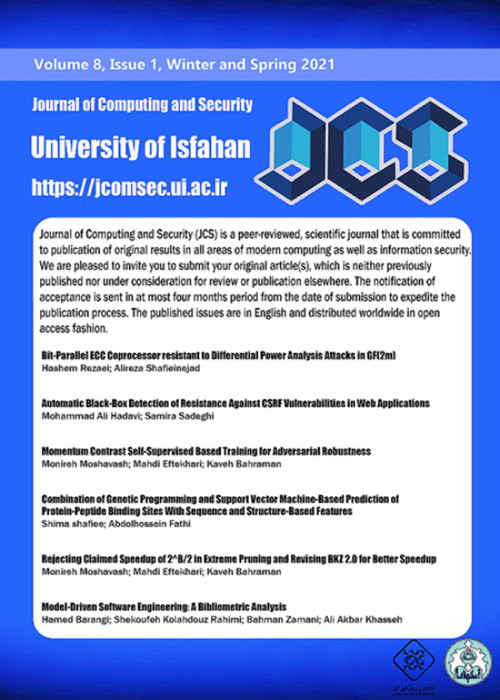A Multi-Dimensional Framework for Virtual Machine Consolidation
Author(s):
Article Type:
Research/Original Article (دارای رتبه معتبر)
Abstract:
Cloud computing is a demand computing model that requires a large number of physical resources and provides services based on the request of each user. A large number of physical servers in data centers have high electrical energy consumption, which causes high operating costs, increases carbon dioxide (CO2) emission. The focus of this paper is on virtual machine consolidation to minimize power consumption, the number of VM migrations and, reducing service level agreement violation. In contrast to the existing works that use CPU utilization for the detection of host overload, a recent study has proposed Multiple Regression Host Overload Detection (MRHOD) and Hybrid Local Regression Host Overload Detection (HLRHOD) algorithms which take multiple factors (CPU, memory, and network bandwidth utilization) into consideration. This paper provides a framework that takes into account multiple factors: CPU, memory, and bandwidth utilization in three terms: host overload detection, VM placement, and service level agreement violation. First, in the host overload detection term, we provide a Separately Local Regression Host Overload Detection (SLRHOD) algorithm that considers CPU, memory, and bandwidth utilization, separately. Second, in terms of VM placement which is an NP-hard problem, the Power Aware Best Fit Decreasing (PABFD) algorithm with consideration of Dot-product (DP) heuristics was proposed. Third CPU and memory take into account the calculation of SLA violation in terms of SLA violation. To evaluate our framework in contrast to existing works, many experiments were performed. For each experiment, we evaluated and compared three objectives, namely energy consumption, service level agreement violation, and the number of VM migrations. Our experiment results show that the Separately Local Regression Host Overload Detection (SLRHOD) algorithm in terms of SLA violations reveals a significant improvement of 80\%. On the other hand, the Separately Local Regression Host Overload Detection (SLRHOD) algorithm saves energy, up to 3\%, compared to the HLRHOD and MRHOD algorithms. Our simulation results show that our proposed algorithm outperforms the existing algorithm and achieves improvements in energy consumption, service level agreement violation, and the number of VM migrations.
Keywords:
Language:
English
Published:
Journal of Computing and Security, Volume:10 Issue: 2, Summer and Autumn 2023
Pages:
82 to 92
magiran.com/p2682842
دانلود و مطالعه متن این مقاله با یکی از روشهای زیر امکان پذیر است:
اشتراک شخصی
با عضویت و پرداخت آنلاین حق اشتراک یکساله به مبلغ 1,390,000ريال میتوانید 70 عنوان مطلب دانلود کنید!
اشتراک سازمانی
به کتابخانه دانشگاه یا محل کار خود پیشنهاد کنید تا اشتراک سازمانی این پایگاه را برای دسترسی نامحدود همه کاربران به متن مطالب تهیه نمایند!
توجه!
- حق عضویت دریافتی صرف حمایت از نشریات عضو و نگهداری، تکمیل و توسعه مگیران میشود.
- پرداخت حق اشتراک و دانلود مقالات اجازه بازنشر آن در سایر رسانههای چاپی و دیجیتال را به کاربر نمیدهد.
In order to view content subscription is required
Personal subscription
Subscribe magiran.com for 70 € euros via PayPal and download 70 articles during a year.
Organization subscription
Please contact us to subscribe your university or library for unlimited access!


